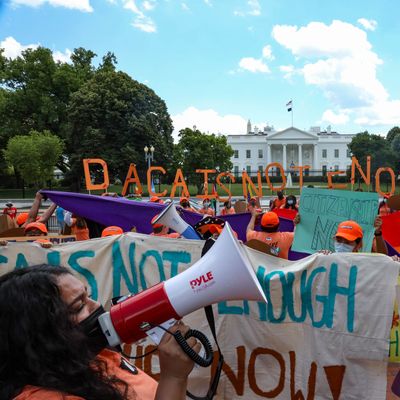
Like every development on the legislative front at the moment, the ruling by Senate parliamentarian Elizabeth MacDonough that major immigration reform provisions are not sufficiently budget-germane to be included (under the Senate’s obscure Byrd Rule) in the FY 2022 budget reconciliation bill is being described as a “damaging and disheartening setback for President Joe Biden [and] congressional Democrats.” It’s certainly a damaging and disheartening setback for immigration reform, which has no chance of getting past a Senate filibuster without the guaranteed simple-majority-vote feature of reconciliation.
The impact of this decision on the other elements of Biden’s agenda that are already being addressed in the reconciliation bill isn’t so clear. In July there were threats by some immigration reform advocates in the House to vote against any reconciliation bill that did not include relief for Dreamers and others needing a path to citizenship. Such warnings, however, were probably like the earlier threats by House progressives to sink the American Rescue Plan stimulus legislation unless it contained a national $15-per-hour minimum wage: an effort to make sure Democratic congressional leaders made reasonable efforts to satisfy progressive priorities. When the minimum wage provision was shot down by MacDonough as being a social and economic policy issue with “incidental” budget impact (the same conclusion she has now reached on immigration), progressives relented and voted for the stimulus bill. It is likely the same thing will happen now.
At the same time, some nervous Democratic centrists are almost certainly relieved that MacDonough (an immigration lawyer, as it happens, before she went to work for the Senate) knocked out the immigration provisions, saving then the trouble and the political leverage of opposing them on grounds that it would have given Republicans a big weapon to wield in the 2022 midterm elections. There are already multiple aspects of the reconciliation bill (still under development in both Houses) that are dividing Democrats, from its overall size and price tag to disputes over health care policy and climate change, to very technical tax issues. Having one less area of intra-party conflict is helpful in that limited sense.
But this leaves the much-frustrated and once-bipartisan cause of immigration reform in a perilous state. Democrats led by Dick Durbin will reportedly go back to the well and see if they can craft less sweeping immigration provisions (those vetoed by MacDonough affected four major categories of immigrants — Dreamers, refugees, agricultural workers and “essential employees” — that added up to as much as eight million people) in hopes of convincing MacDonough that they don’t add up to a reform agenda in which the budget impact is “incidental.” But if as is widely expected Republicans take back control of the House in the midterms Congress will likely return to the gridlocked situation that existed during Trump’s presidency, when many Republicans in theory supported a path to citizenship for Dreamers (which happens to poll very well) but kept holding it hostage to obnoxious border security demands, most notably Trump’s wall.
Some immigration reform advocates and their progressive allies will react to MacDonough’s ruling by demanding once again that she be fired or that Senate Democrats get rid of the filibuster. Neither of these remedies for progressive misery are going to happen unless Democrats surprise us all by making big Senate gains in 2022 while holding onto the House.






























